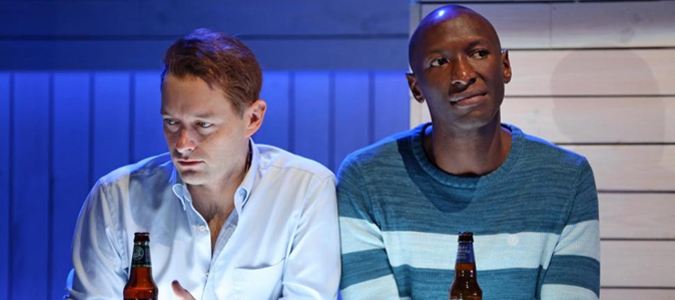

Bootycandy
Opening Night: September 10, 2014
Closing: October 12, 2014
Theater: Playwrights Horizons
Sutter is on an outrageous odyssey through his childhood home, his church, dive bars, motel rooms and even nursing homes. A kaleidoscope of sketches that interconnect to portray growing up gay and black, Robert O’Hara’s subversive, uproarious satire crashes headlong into the murky terrain of pain and pleasure and… BOOTYCANDY.
BUY TICKETSREAD THE REVIEWS:
September 10, 2014
In one of the sharpest scenes in Bootycandy, Robert O’Hara’s searing and sensationally funny comedy about the sometimes poisonous attitude toward homosexuality in black culture, an adolescent boy hesitantly tells his mother and stepfather that a man tried to follow him home from the library. The reaction isn’t the concern and outrage we expect, to say the least. “What was you doing?” his mother suspiciously demands. Reading a book, comes the meek answer. “You was just sitting up in a library reading a book, and some man got up and decided to try to follow you home?” she says scornfully. His stepfather, vaguely hearing this conversation, barely looks up from his paper to mutter his own comment: “You need to take up some sports.” The scene grows only more bracing and hilarious as the interrogation continues. When the boy, Sutter (Phillip James Brannon), who’s decked out in full Michael Jackson regalia, complete with one sequined glove, reminds his mother that this same man has approached him before, she and his stepfather continue to view his experience as proof of his own wayward behavior. Why the hell is he reading the likes of Jackie Collins anyway? Why does he play so many Whitney Houston albums? The ultimate solution to this problem of men following him around, proposed by this dismissive mother: “This school year: no musicals.”
READ THE REVIEWSeptember 10, 2014
George C. Wolfe’s The Colored Museum, an Off Broadway hit in 1986, was groundbreaking in the way a gravedigger is. Amid brilliant satirical confetti it declared an end to a certain strain of black theater writing exemplified by a sketch he titled “The Last Mama-on-the-Couch Play,” taking off on the domestic piety of A Raisin in the Sun. Now, the wittiest of the post-Wolfe provocateurs, Robert O’Hara, opens the season at Playwrights Horizons with the insanely entertaining Bootycandy, a play whose very title (a euphemism for penis that’s way more embarrassing than the word it replaces) would give Raisin’s Lena Younger palpitations. But then O’Hara has no interest in earnest accommodation and stylistic comfort. As the play opens, the mama figure isn’t on the couch (she’s in a short skirt, putting on lipstick) and she isn’t trying to straighten out an aimless son whose “brow is heavy from 300 years of oppression” (as Wolfe put it). Rather she’s trying to straighten out a proto-gay preschooler who has too many questions about personal hygiene and blowjobs.
READ THE REVIEWSeptember 10, 2014
Built to make you wince and laugh, the bold but uneven “Bootycandy” wastes no time in doing both. Minutes into the production, Sutter, an effeminate African-American kid, gets shouted at by his sharp-mouthed mama to wash a particular body part — the one evoked by the play’s title. Fortunately, writer and director Robert O’Hara doesn’t sanitize or scrub his satire one bit. The show is delectably un-PC and potty-mouthed. It’s also performed to perfection by a cast of five that’s game for anything. Centered around Sutter (Phillip James Brannon), the show unfolds as a series of loosely woven vignettes about being black and gay. It follows Sutter from awkward innocence to confident experience, which includes developing an appetite for racially charged revenge. Each skit is preceded by a title projected above the stage.
READ THE REVIEWSeptember 10, 2014
Robert O’Hara’s Bootycandy, a series of sketches on the theme of being black and gay in modern America, plays like a particularly subversive episode of Saturday Night Live. The show, playing through Oct. 12 at Off Broadway’s Playwrights Horizons, is often laugh-out-loud funny, with a cutting satiric edge that recalls George C. Wolfe’s The Colored Museum. Many scenes center on Sutter (Phillip James Brannon), an apparent stand-in for O’Hara whose boyhood obsessions with Michael Jackson and the novels of Jackie Collins underscore an estrangement from his family and much of African American society. ”How do you expect to get a woman when you grow up when all you do is read?” his clueless stepfather (Lance Coadie Williams) asks at the kitchen table.
READ THE REVIEWSeptember 10, 2014
Want therapy? Get out of the theater and into a psychologist’s office. This the (mostly) unstated message percolating behind Bootycandy, the raucous, if slightly rocky, play by Robert O’Hara that just opened at Playwrights Horizons. In the wacky theatrical world of O’Hara’s creation, you may not be able to avoid “boundary-pushing” confessionals and tell-alls about what it’s like to come of age, say, black and/or gay, but you don’t have to like them, and you certainly don’t have to produce them — and chances are, it would be much better for audiences if you didn’t. O’Hara arrives there indirectly, by first demonstrating a hilarious collection of ways this notion can go horribly wrong. We’re first introduced to young Sutter (Phillip James Brannon), who, adrift in the mid 1970s, is still learning about everything from punctuation to parental authority to, well, his own reproductive organs. Bootycandy is, in fact, what his mother (Jessica Frances Dukes) has convinced Sutter to call them, though she doesn’t like his innocent carrying of the metaphor too far. (“So can I lick it?”) In this way and others, from mom’s general behavior to the cap she makes him wear that accentuates his already out-of-control afro, Sutter clearly has mother issues.
READ THE REVIEWSeptember 10, 2014
You’ll have to see the show to learn what body part Bootycandy, the peculiar, slang-style title of Robert O’Hara’s satirical and offbeat five-actor play, is a codeword for. It’s actually a surprise. However, I can tell you that the show, which serves as the season opener for Off-Broadway’s Playwrights Horizons, is an uneven, messy but often hilarious ride throughout the imagination and memories of a gay African-American male. Imagine a graduate school seminar in gender and racial studies and deconstructionist theory, as told through the skit-like structure and over-the-top tone of Saturday Night Live. The first few vignettes include an awkward “birds and the bees” chat between a mother and son, a pastor who reveals himself to be a cross-dresser in front of his congregation, a four-way phone conversation about an extremely inappropriate name for a baby and a rambling homeless man.
READ THE REVIEW





















